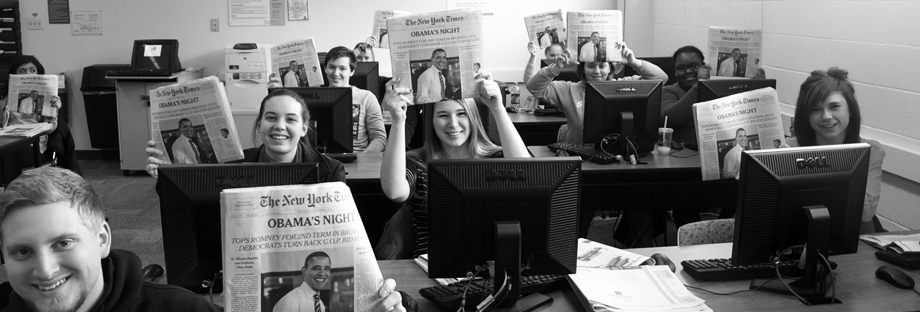As you will see when we workshop our digital portfolios in class, you will not need to repost all of the work that you did in this class. Rather, your portfolio’s design is based on your judicious collecting, selecting, reflecting, and presenting samples that you choose. All portfolios have these three required components:
 “A good newspaper, I suppose, is a nation talking to itself” – Arthur Miller, 1961. Discuss. 250 words, and be specific. All good writing is specific. 2-3 specific examples in a 250-word reflection such as this one seems about right.
“A good newspaper, I suppose, is a nation talking to itself” – Arthur Miller, 1961. Discuss. 250 words, and be specific. All good writing is specific. 2-3 specific examples in a 250-word reflection such as this one seems about right.
 Carefully and rhetorically integrated text, images, and embedded links
Carefully and rhetorically integrated text, images, and embedded links

What follows is a brainstormed list from class of other optional approaches and useful portfolio topics — both sections participated, so there may be some overlap:
- Thinking, critical thinking, and perplexity
- Non-cognitive skills (optional, depending on your own academic and professional interests)
- Persistence
- Dependability
- Sociability
- Problem solving
- Confidence
- Motivation
- Willingness to embrace ambiguity
- Self direction
- Emotional maturity
- Emotional intelligence
- Organizational skills
- Study habits
- Time-management practices
- Cultural sensitivity
- Tolerance for diversity
- Tendency to be open to new feelings, thoughts, and values
- Conscientiousness, the tendency to be organized, achievement-focused, disciplined, and industrious
- Extraversion, defined as the tendency to be friendly, cheerful, social, and energetic
- Agreeableness, the tendency to be sympathetic, kind, trusting, and cooperative
- No B.S.-ing
- Moving from writer-based writing to reader-based writing
- rhetorical precis
- textual/rhetorical analysis
- meta-cognition, meta-awareness
- critical thinking
- joining a community of intellectually engaged, curious, culturally and civically aware citizens and students
- using the NYT to write, to analyze, and to educate yourself
- argumentation/advocacy
- applying life experiences to problem solving
- reflection
- print vs. digital composing & reading
- digital literacy
- resourcefulness: Oxford English Dictionary
- resourcefulness: Writing Center
- resourcefulness: St. Martin’s Guide
- resourcefulness: office hours
- typography
- visual analysis
- politics
- ideology (critical thinking is the best ideology to have, by the way)
- rhetorical situation — triangle
- rhetoric: an ongoing negotiation between people, texts, and contexts
- expressing ideas
- cupcakes
- dialogic responses
- reading comprehension — reading deeply — reading as though it matters, because it does
- revision / editing / proofreading
- reflective thinking
- textual / rhetorical analysis
- presidential election!
- course contract
- NYT as an organizing principle for the world? Front page as a table of contents for the world?
- writing with more confidence (probably related to no-b.s. writing)
- argumentation / advocacy
- editing for logistical and visual coherence
- politics
- there’s not two, but three sides to every story or issue. seeing only two sides is a trap.
- paying attention to the world
- audience-based writing: writing for real, actual, genuine readers
- finding one’s writing voice
- editorial peer reviews
- co-inquiry pedagogy, where the teacher is not always the authority, but where he brings his own questions and concerns to class to pose right along with yours
